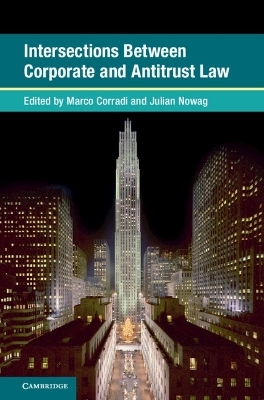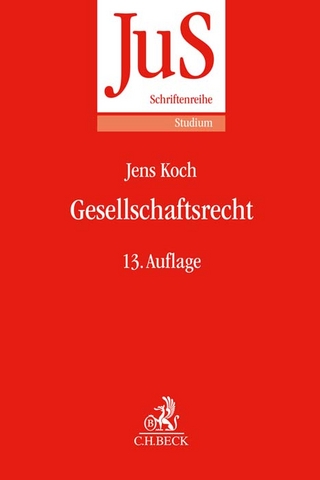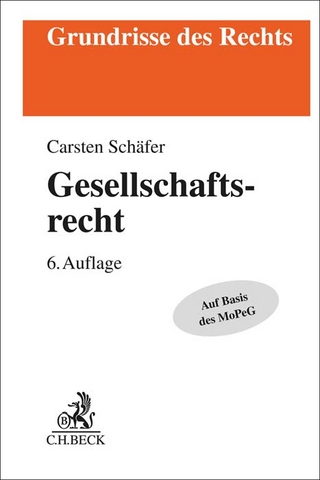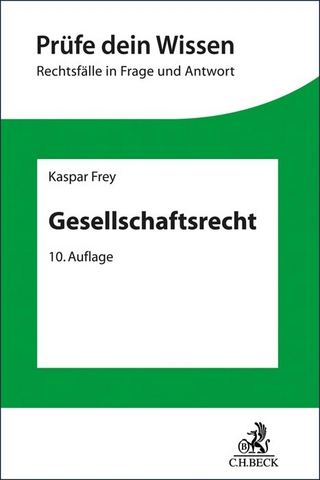
Intersections Between Corporate and Antitrust Law
Cambridge University Press (Verlag)
978-1-108-84187-0 (ISBN)
Recent public debate on common ownership by institutional investors has brought awareness to one of the many intersections between the corporate and antitrust worlds. But the interplay between these two fields dates back to the dawn of US antitrust. This volume shines a light on the often underplayed and misunderstood connections between antitrust and corporate law and finance. It offers a multi-disciplinary perspective on highly trending issues, such as parallel equity holdings, interlocking directorships, the anticompetitive effects of certain corporate governance arrangements, and the relationships between ESG and not-for profit activities with antitrust law. This edited collection brings together leading experts from across the US, Europe, and Asia and provides a cross-border perspective on alternative policy approaches for the field. This book is also available as Open Access on Cambridge Core.
Marco Corradi is assistant professor at ESSEC Business School in Paris and Singapore. Julian Nowag is an associate professor at Lund University and an associate researcher at the Oxford Centre for Competition Law and Policy.
Introduction; Part I. The Object and Purpose of Corporations: 1. Corporate law, antitrust, and the history of democratic control of the balance of power, Michelle Meager (University College London); 2. ESG policies at the intersection between competition and corporate law, Marco Corradi and Julian Nowag (Lund University); 3. Not for profit organisations and competition law, Okeoghene Odudu (Cambridge University); Part II. The Boundaries of the Corporation: 4. The boundaries of the firm and the reach of competition law: corporate group liability and sanctioning in the EU and the US, Carsten Koenig (University of Collogne); 5. Piercing the corporate veil: the German sausage saga, Mareike Walter and Martin Schunke (Hogan Lovells); 6. Chaebol regulation in korea and the relationship between competition and company law, Myungsu Hong (Myongji University); Part III. The Governance of Corporations: 7. Antitrust by interior means, Ramsi Woodcock (University of Kentucky); 8. Directors' duty of loyalty: and competition, Marco Corradi (EESEC) and Julian Nowag (Lund University); Part IV. Beyond the Boundaries of the Corporation: 9. Horizontal directors in the US revisited, Yaron Nili (University of Wisconsin); 10. Interlocking directorates in Europe – an enforcement gap? Florence Thepot (University of Glasgow); 11. The curious case of Italian interlocking directorates, Federico Ghezzi and Chiara Picciau (Bocconi Business School); 12. Conceptual breakthroughs on common ownership and competition: a framework for evaluating policy Martin Schmalz (Oxford University); 13. Does common ownership explain higher oligopolistic profits?, Edward Rock and Daniel Rubinfeld (New York University); 14. Common ownership by investment management corporations and eu policies: please, play puzzles and not mikado!, Marco Corradi (ESSEC); 15. Common ownership and minority shareholding at the intersection of competition and corporate law: looking through the past to return to the future?, Anna Tzanaki (Lund University); 16. Competition law, big tech and financialisation: the dark side of the moon, Ioannis Lianos and Andrew McLean (University College London).
| Erscheinungsdatum | 22.09.2021 |
|---|---|
| Reihe/Serie | Global Competition Law and Economics Policy |
| Zusatzinfo | Worked examples or Exercises |
| Verlagsort | Cambridge |
| Sprache | englisch |
| Maße | 159 x 235 mm |
| Gewicht | 640 g |
| Themenwelt | Recht / Steuern ► EU / Internationales Recht |
| Recht / Steuern ► Wirtschaftsrecht ► Gesellschaftsrecht | |
| Recht / Steuern ► Wirtschaftsrecht ► Wettbewerbsrecht | |
| Wirtschaft ► Betriebswirtschaft / Management ► Finanzierung | |
| ISBN-10 | 1-108-84187-2 / 1108841872 |
| ISBN-13 | 978-1-108-84187-0 / 9781108841870 |
| Zustand | Neuware |
| Informationen gemäß Produktsicherheitsverordnung (GPSR) | |
| Haben Sie eine Frage zum Produkt? |
aus dem Bereich


